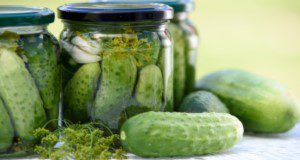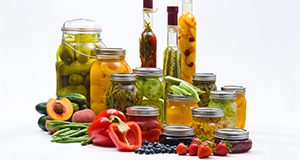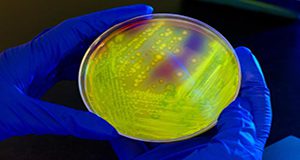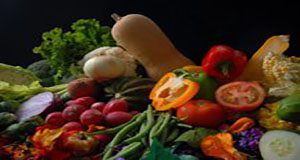A contract packager, commonly called a co-packer, is a manufacturer that will produce, package, and/or label a product for clients. This new 7-page factsheet provides a brief overview on the definition of co-packers, advantages and disadvantages of using a co-packer, and the list of things you need to consider when you hire and work with a co-packer. It also includes a noncomprehensive list of co-packers in Florida and Georgia. This factsheet is one in the Food Entrepreneurship in Florida series, which serves as a useful guide to help run a successful food-related business. Written by Alison O’Donoughue, Wendi Jennings, and Soohyoun Ahn, and published by the UF/IFAS Food Science and Human Nutrition Department.
https://edis.ifas.ufl.edu/fs380
Tag: Soohyoun Ahn
How to Start a Food Business: Basic Food Technology; Food Acidity
Food acidity is an important parameter in food product development. Most people know that food acidity influences flavor, but more importantly, food acidity can affect the ability of microorganisms to grow in food. Food acidity, or the amount of acid that is present in the food, is used to classify a food product, and that classification determines the regulatory requirements for the specific food product. This new 6-page publication of the UF/IFAS Food Science and Human Nutrition Department describes how to measure food acidity and how food is classified based on its acidity. Written by Soohyoun Ahn, Jayna Goldstein, George Baker, and Matthew Krug.
https://edis.ifas.ufl.edu/fs325
Facility Registration and Initial Regulatory Compliance Activities for Acidified Food and Low-Acid Canned Food Processors in Florida
Food businesses are subject to a wide range of regulatory requirements. Food entrepreneurs who want to produce and sell acidified foods or low-acid canned foods must abide by specific FDA regulations. This new 3-page document intends to clarify the initial steps food entrepreneurs must implement to comply with these regulations. This factsheet is one in a Food Entrepreneurship in Florida series, which assists beginning and established food entrepreneurs by providing them information on topics highly relevant to starting and running a food business: regulations, safety, labeling, processing, and marketing. Written by Matthew Krug and Soohyoun Ahn, and published by the UF/IFAS Food Science and Human Nutrition Department, February 2019.
http://edis.ifas.ufl.edu/fs318
Budget Template for Home Canning
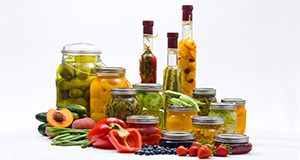
One in five US households cans fruits or vegetables in a home kitchen. If your household is one of them, you may want to know the full cost of the activity or how much money you are saving by doing it yourself. This 10-page fact sheet written by Kevin R. Athearn, Amarat Simonne, and Soohyoun Ahn and published by the UF/IFAS Food and Resource Economics Department presents a template designed to assist you in estimating the cost and potential returns from canning food at home.
http://edis.ifas.ufl.edu/fe1034
Clostridium difficile: An Important Opportunistic Pathogen in Healthcare-Associated Infections
Healthcare-associated infections are infections that patients can get while receiving medical treatment in a healthcare facility. One opportunistic pathogen, Clostridium difficile, has been getting more attention in recent years because of its association with antibiotic use and a high death rate among the elderly. This 7-page factsheet will provide an overview of Clostridium difficile infection (CDI) with a focus on healthcare-associated infections. Written by Soohyoun Ahn and Amarat H. Simonne and published by the UF/IFAS Department of Food Science and Human Nutrition, January 2018.
http://edis.ifas.ufl.edu/fs253
The Food Safety Modernization Act of 2011-Final Rule for Preventive Controls for Human Food

This 7-page fact sheet is one in a series covering the different rules promulgated under the new Food Safety Modernization Act (FSMA), which was signed into law on January 4, 2011. It is intended to provide an overview of the final Preventive Controls for Human Food (PCHF) rule. Written by Jessica A. Lepper, Soohyoun Ahn, Keith R. Schneider, Michelle D. Danyluk, and Renee Goodrich-Schneider and published by the UF/IFAS Department of Food Science and Human Nutrition, January 2018.
http://edis.ifas.ufl.edu/fs301
Best Practices for Shoppers at the Farmers' Market
Farmers’ markets are popular, diverse places to shop for fresh, local food, nursery stock, handmade crafts, and much more. This 3-page fact sheet is one in a “Florida Farmers’ Markets” series and offers recommendations for shoppers for a successful farmers’ market experience. Written by Maria Rometo, Jamie Sapijaszko, and Soohyoun Ahn and published by the UF/IFAS Department of Food Science and Human Nutrition, November 2017.
http://edis.ifas.ufl.edu/fs302
Food Allergies
A food allergy is a specific immune system reaction that happens after a person consumes what is normally considered a safe food. Reactions can range in severity from minor to fatal. This 4-page document discusses the cause, symptoms, and management of food allergies in children and adults. Written by Keith R. Schneider, Renee Goodrich-Schneider, Soohyoun Ahn, Susie Richardson, Ploy Kurdmongkoltham, and Bruna Bertoldi and published by the UF/IFAS Department of Food Science and Human Nutrition, November 2017.
http://edis.ifas.ufl.edu/fs123
Food Safety Tips for the Holiday Season
Food is always an important part of holiday festivities, but holiday meals can take a turn for the worse if food safety is not properly practiced when preparing and cooking the food. This 7-page factsheet provides information about safe food practices for the holidays. Written by Soohyoun Ahn, Jessica A. Lepper, and Keith R. Schneider and published by the UF/IFAS Department of Food Science and Human Nutrition, November 2017.
http://edis.ifas.ufl.edu/fs260
Preventing Foodborne Illness: Campylobacteriosis
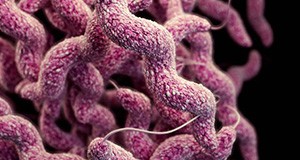
Campylobacteriosis is a gastrointestinal infection caused by bacteria of the genus Campylobacter. These bacteria require low levels of oxygen to survive and have been found in wild birds, poultry, pigs, cattle, domesticated animals, unpasteurized milk, produce, and contaminated water. A part of a series on preventing foodborne illness, this five-page fact sheet describes the Campylobacter bacteria, the causes and symptoms of campylobacteriosis disease, and how to prevent the disease through good sanitation methods and practices for receiving, handling, processing, and storing food products. Written by Soohyoun Ahn, Renée M. Goodrich-Schneider, Rachael Silverberg, and Keith R. Schneider, and published by the Food Science and Human Nutrition Department.
http://edis.ifas.ufl.edu/fs098
Food Safety for the Holiday Season
 Food is always an important part of holiday festivities, but holiday meals can take a turn for the worse if food safety is not properly practiced when preparing and cooking the food. The food you serve your family and friends can be very harmful if your turkey, ham, or home-prepared meat products are not appropriately handled. The good news is that by practicing four basic food safety measures you can help prevent foodborne illness over the holiday season. This 6-page fact sheet provides information about safe food practices for the holidays. Written by Soohyoun Ahn and Keith R. Schneider, and published by the UF Department of Food Science and Human Nutrition, December 2014. (Photo: Stockbyte/Thinkstock)
Food is always an important part of holiday festivities, but holiday meals can take a turn for the worse if food safety is not properly practiced when preparing and cooking the food. The food you serve your family and friends can be very harmful if your turkey, ham, or home-prepared meat products are not appropriately handled. The good news is that by practicing four basic food safety measures you can help prevent foodborne illness over the holiday season. This 6-page fact sheet provides information about safe food practices for the holidays. Written by Soohyoun Ahn and Keith R. Schneider, and published by the UF Department of Food Science and Human Nutrition, December 2014. (Photo: Stockbyte/Thinkstock)
http://edis.ifas.ufl.edu/fs260
How to Start a Food Business: Writing a Business Plan
 Before starting a new food business, you should set a goal and have detailed plans to accomplish that goal. But writing a good business plan is often a challenge and it requires a great amount of effort. This 3-page fact sheet provides guidance on how to write a good food-business plan. Written by Soohyoun Ahn, Lisa House, and Renée Goodrich-Schneider, and published by the UF Department of Food Science and Human Nutrition, December 2014. (Photo: iStock/Thinkstock)
Before starting a new food business, you should set a goal and have detailed plans to accomplish that goal. But writing a good business plan is often a challenge and it requires a great amount of effort. This 3-page fact sheet provides guidance on how to write a good food-business plan. Written by Soohyoun Ahn, Lisa House, and Renée Goodrich-Schneider, and published by the UF Department of Food Science and Human Nutrition, December 2014. (Photo: iStock/Thinkstock)
http://edis.ifas.ufl.edu/fs259
Food Safety at Tailgating
 While tailgating can be a great fun for family and friends, you need to make plans and take on-site precautions to keep your food safe during these events. Since refrigerators and running water are not always available for the events, you should familiarize yourself with the safe food handling practices for these outdoor events and plan ahead so you will be prepared with enough coolers/ice and all the tools you need to keep and cook your food safely. This 3-page fact sheet provides information on safe food practices for tailgating and other outdoor sporting events. Written by Soohyoun Ahn, Amarat H. Simonne, and Keith R. Schneider, and published by the UF Department of Food Science and Human Nutrition, October 2014.
While tailgating can be a great fun for family and friends, you need to make plans and take on-site precautions to keep your food safe during these events. Since refrigerators and running water are not always available for the events, you should familiarize yourself with the safe food handling practices for these outdoor events and plan ahead so you will be prepared with enough coolers/ice and all the tools you need to keep and cook your food safely. This 3-page fact sheet provides information on safe food practices for tailgating and other outdoor sporting events. Written by Soohyoun Ahn, Amarat H. Simonne, and Keith R. Schneider, and published by the UF Department of Food Science and Human Nutrition, October 2014.
http://edis.ifas.ufl.edu/fs256
How to Start a Food Business: Introduction
 While running your own food business can be a rewarding and exciting experience, it can be overwhelming and stressful. It is important to understand the pros and cons of running your own food business and decide if you are ready to pursue a food business venture. This 3-page fact sheet was written by Soohyoun Ahn, Renee Goodrich-Schneider, and Amarat H. Simonne, and published by the UF Department of Food Science and Human Nutrition, September 2014.
While running your own food business can be a rewarding and exciting experience, it can be overwhelming and stressful. It is important to understand the pros and cons of running your own food business and decide if you are ready to pursue a food business venture. This 3-page fact sheet was written by Soohyoun Ahn, Renee Goodrich-Schneider, and Amarat H. Simonne, and published by the UF Department of Food Science and Human Nutrition, September 2014.
http://edis.ifas.ufl.edu/fs254
Clostridium difficile: an Important Opportunistic Pathogen in Healthcare-Associated Infections
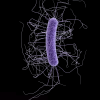 Opportunistic pathogens are significant health threats to vulnerable people with weakened immune systems, such as people with HIV/AIDS or those on immune-suppressing therapies. One opportunistic pathogen, Clostridium difficile, has been getting more attention in recent years because of its association with antibiotic use and high death rate in the elderly. This factsheet will provide an overview of Clostridium difficile infection (CDI) with a focus on healthcare-associated infections. This 5-page fact sheet was written by Soohyoun Ahn and Amarat H. Simonne, and published by the UF Department of Food Science and Human Nutrition, September 2014.
Opportunistic pathogens are significant health threats to vulnerable people with weakened immune systems, such as people with HIV/AIDS or those on immune-suppressing therapies. One opportunistic pathogen, Clostridium difficile, has been getting more attention in recent years because of its association with antibiotic use and high death rate in the elderly. This factsheet will provide an overview of Clostridium difficile infection (CDI) with a focus on healthcare-associated infections. This 5-page fact sheet was written by Soohyoun Ahn and Amarat H. Simonne, and published by the UF Department of Food Science and Human Nutrition, September 2014.
http://edis.ifas.ufl.edu/fs253
The Food Safety Modernization Act of 2011 – Proposed Rule for Preventive Controls for Human Food
 The Food Safety Modernization Act (FSMA), which was signed into law by President Obama on January 4, 2011, is the most sweeping reform of food safety laws in more than 70 years since the enactment of the Federal Food, Drug and Cosmetic Act of 1938. High-profile foodborne outbreaks in the last decade and their impact on public health and the economy have exposed the need for a new, modern food safety system. FSMA aims to ensure the safety and security of the US food supply by focusing on preventing food safety problems rather than responding after they occur. This law provides the FDA with new enforcement authorities to achieve a higher rate of compliance with food safety standards and to respond better to problems. This 5-page fact sheet was written by Soohyoun Ahn, Keith R. Schneider, Michelle D. Danyluk, and Renee Goodrich-Schneider, and published by the UF Department of Food Science and Human Nutrition, April 2014.
The Food Safety Modernization Act (FSMA), which was signed into law by President Obama on January 4, 2011, is the most sweeping reform of food safety laws in more than 70 years since the enactment of the Federal Food, Drug and Cosmetic Act of 1938. High-profile foodborne outbreaks in the last decade and their impact on public health and the economy have exposed the need for a new, modern food safety system. FSMA aims to ensure the safety and security of the US food supply by focusing on preventing food safety problems rather than responding after they occur. This law provides the FDA with new enforcement authorities to achieve a higher rate of compliance with food safety standards and to respond better to problems. This 5-page fact sheet was written by Soohyoun Ahn, Keith R. Schneider, Michelle D. Danyluk, and Renee Goodrich-Schneider, and published by the UF Department of Food Science and Human Nutrition, April 2014.
http://edis.ifas.ufl.edu/fs248
Dealing with Food Allergies
 A food allergy is an immune system reaction that happens after a person consumes what is normally considered a safe food. Food allergies occur more often in children than in adults: 4%–8% of those aged 4 or under and about 2% of adults are affected. Allergic reactions from food have led to over 20,000 emergency room visits per year. Annually, between 150 and 200 fatalities associated with food allergic reactions occur in the United States. This 4-page fact sheet was written by Keith R. Schneider, Renée Goodrich Schneider, Soohyoun Ahn, and Susie Richardson, and published by the UF Department of Food Science and Human Nutrition, January 2014.
A food allergy is an immune system reaction that happens after a person consumes what is normally considered a safe food. Food allergies occur more often in children than in adults: 4%–8% of those aged 4 or under and about 2% of adults are affected. Allergic reactions from food have led to over 20,000 emergency room visits per year. Annually, between 150 and 200 fatalities associated with food allergic reactions occur in the United States. This 4-page fact sheet was written by Keith R. Schneider, Renée Goodrich Schneider, Soohyoun Ahn, and Susie Richardson, and published by the UF Department of Food Science and Human Nutrition, January 2014.
http://edis.ifas.ufl.edu/fs123
Preventing Foodborne Illness: Shigellosis (FSHN0517/FS128)
 Shigellosis occurs when virulent Shigella organisms are consumed and invade the intestinal mucosa, resulting in tissue destruction. Most Shigella infections are spread by stools or soiled fingers of an infected person to the mouth of another person when basic hygiene and handwashing are not properly done. This 5-page fact sheet was written by Keith R. Schneider, Soohyoun Ahn, and Renée M. Goodrich-Schneider, and published by the UF Department of Food Science and Human Nutrition, July 2012.
Shigellosis occurs when virulent Shigella organisms are consumed and invade the intestinal mucosa, resulting in tissue destruction. Most Shigella infections are spread by stools or soiled fingers of an infected person to the mouth of another person when basic hygiene and handwashing are not properly done. This 5-page fact sheet was written by Keith R. Schneider, Soohyoun Ahn, and Renée M. Goodrich-Schneider, and published by the UF Department of Food Science and Human Nutrition, July 2012.
http://edis.ifas.ufl.edu/fs128

